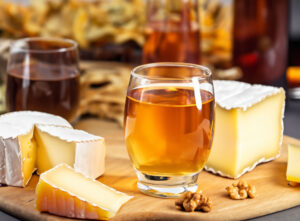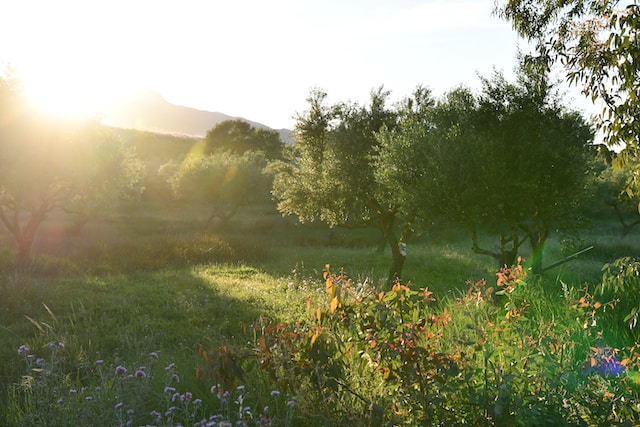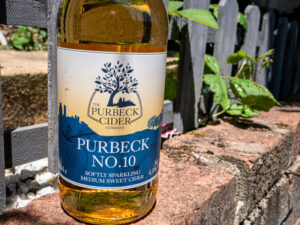
A helpful beginner’s guide to pairing cheese and cider
Back to all We live in a world where cheese

Ah, cider! The crisp and refreshing elixir that tickles the taste buds and warms the heart. The full history of cider is as rich and captivating as the drink itself.
So, grab a glass of your favourite cider, sit back, and let us embark on a journey through time, exploring the origins and evolution of this beloved beverage.
KEY TAKEAWAYS
Our story begins in the heart of the Roman Empire. Picture this: a brave band of Romans, sailing across the treacherous seas, arrives on the shores of Britain in 55 B.C.
55 B.C is the first recorded reference of cider, when the Roman Empire discovered the locals of Britian drinking a cider-like drink.
The Romans wasted no time in spreading their love for cider across wider parts of Europe.
As they journeyed, historians have uncovered evidence of Germanic tribes delighting in this tantalising libation.
Monasteries, too, played a significant role in the history of cider.
These pious institutions not only indulged in cider for personal pleasure but also produced it for sale to the public, no doubt spreading cheer far and wide.
It was the Normans who truly cultivated a fondness for cider and left an indelible mark on its history.
These conquerors established orchards across the land and introduced advanced pressing technology.
They also brought with them tannic and acidic cider apples, which added depth and complexity to the beverage.
In fact, the Normans were so enamoured with cider that they installed the very word ‘cider’ into the English language.
Now that’s what I call leaving a lasting impression!
By the 14th century, cider had meandered its way north to Yorkshire and had spread out to counties such as Worcestershire, Herefordshire, and Somerset.
It was a delightful quaff, enjoyed by the masses, but wine still held sway as the more popular beverage heading into the Tudor age.
However, climate and conflict were about to conspire to change the course of history for cider.
A period of global cooling, starting from the 16th century, made vine growing and grape harvesting an unviable process. But fear not, for apples proved to be hardy little warriors, able to withstand the chill of those times.
Wars with Spain and France further played into cider’s hands, as imports of sherry, brandy, and wine into England were hampered.
With the English Civil War and the subsequent execution of King Charles I in 1649, aristocratic courtiers found themselves redundant, seeking solace in their country estates and embarking on experimental cider-making adventures.
In a stroke of historical serendipity, these cider-makers of the seventeenth century were producing sparkling cider using a secondary fermentation in reinforced glass bottles sealed with corks.
Yep, you read that right! They were crafting fizzy delights before the birth of the man widely credited with inventing Champagne, Dom Perignon. It seems cider was quite the trendsetter!
Across the Atlantic, it didn’t take long for early settlers in North America to embrace the art of cider-making.
Within a mere decade, apple trees were being planted on the east coast, starting in the Massachusetts Bay Colony.
Cider gradually became the most popular alcoholic drink in Colonial America, with homesteads boasting apple orchards and even using cider as a substitute for money in certain communities.
Imagine paying your taxes with a barrel of cider!
Cider’s reign as the United States’ beverage of choice was short-lived.
The industrial revolution, mass immigration, and cheap grain prices during the 19th and 20th centuries pushed cider to the sidelines in favour of beer.
Yet, the biggest blow to American cider was prohibition.
With the stroke of a pen, cider orchards were felled, and the resumption of alcohol consumption saw grain diverting into beer production, surpassing the demand for apples.
Today, cider consumption in the United States stands at a mere 1%.
A true tragedy.
Fear not, fellow cider enthusiasts, for the story doesn’t end there.
Cider-making has now become a global industry, with the United Kingdom taking the lead. Producing a staggering 750 million litres of cider per year, the UK utilises just over half of all the apples cultivated across its lands.
So, raise your glasses high and toast to the continued success of this delightful beverage that has stood the test of time.
As we bring our journey through cider’s captivating history to a close, let us remember the Romans who sailed, the Normans who conquered, and the pioneers who fermented their way into our hearts.
Let cider be a reminder that the simplest things in life, like a humble apple, can yield the most extraordinary of libations.
Here’s to cider, a true testament to the apple’s ability to enchant and intoxicate us all!
Cheers!

Back to all We live in a world where cheese

Back to all When we first started this blog, I

Back to all KEY TAKEAWAYS 4.8% ABV Amber hue Bittersweet